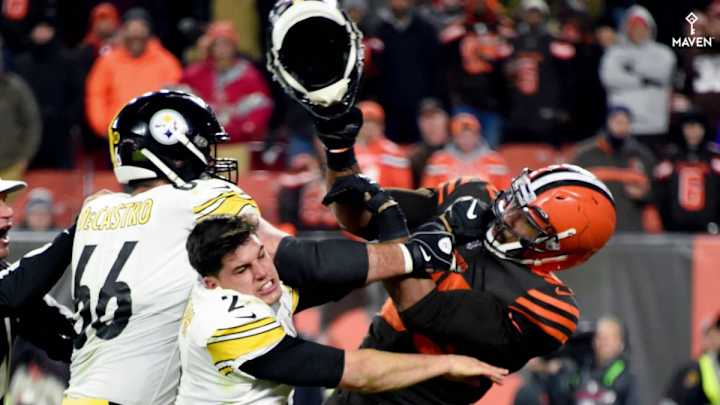Myles Garrett Interview Highlights Failures By NFL, Makes Significant Allegation

While everyone is focused on the he said, he said, threats of lawsuits and the more salacious details being revisited after Myles Garrett's interview with Mina Kimes on Outside the Lines, what's getting lost is the NFL's culpability in creating the issue. People can be upset or annoyed that the Cleveland Browns defensive end is revisiting the incident and Pittsburgh Steelers quarterback Mason Rudolph should be provided an equal platform to defend himself. Nevertheless, the more important aspect of what Garrett brought up in the interview is the NFL's failure to keep the appeal they had with Garrett confidential. That's in addition their inability to produce the audio to truly investigate the issue, whether it's due to unwillingness or what seems like a one in a million shot that somehow the overwhelming amount of audio equipment on the field in a nationally televised game, both on the sideline and in helmets of players somehow managed to miss it.
The only reason the discussion of racial slurs even comes up is the NFL's inability to keep a confidential meeting remotely private. Garrett was barely out the door before national reporters had what was said in that room. They might as well have broadcast it. So if Rudolph didn't say it, he has every right to be mad at Garrett, but whether he did or not, he should also be upset with the NFL for allowing that to come to light.
Garrett on why he didn't want the accusation in his appeal leaked:
"Because I didn't want to try to use it as justification for my actions, because there's nothing to justify. Like, there's nothing that I can say or do to justify what I did on that day. I'm not saying it to justify that I didn't do anything wrong."
Garrett isn't trying to shirk responsibility for what he did nor did he when it happened. Now, given the fact this is three months ago, those cynical this happened can say that he's effectively had plenty of time to come up and rehearse the most compelling case in light of all that happened. They can also question the timing. Regardless, he said then and said now he was wrong and Rudolph allegedly saying that doesn't excuse anything.
If Rudolph didn't say it, he should be just as mad at the NFL's inability to produce the audio to exonerate him. From the NFL's perspective, they better hope audio doesn't exist, because if a company like TMZ can procure and release it, it would be an incredibly embarrassing scandal. It would be an active cover up on their part.
Garrett said of the audio:
"Most quarterbacks wear [microphones] in their helmets. He somehow lost his helmet and had to get another one without a mike. There were guys that were miked up near me - near us during that time that didn't hear anything. And from what I've heard, there have been audio that could have heard or something or could not have heard something. They don't want to say. So, something was said. I know something was said. Now, whether the NFL wants to acknowledge it, that's up to them."
While his unwillingness to back down from his belief that Rudolph referred to him by a racial slur and the fallout from that, including statements from Rudolph as well as his lawyer and Pittsburgh Steelers head coach Mike Tomlin are getting the coverage, Garrett is inferring there is audio out there that can provide an answer and the NFL seemingly wants to bury it, which is a massive deal. As for Tomlin, his credibility on this topic is non-existent after he came out and claimed his team did nothing wrong, when the video clearly refutes that claim.
Garrett had to stand by what he told the NFL in his appeal in order to say what he believed about the NFL appeal process failing to be confidential as well as his belief that audio exists. And since Rudolph insists he didn't say it, he had to respond accordingly. That doesn't change the fact the most important takeaway from Garrett's interview is what he said regarding the NFL, which may finally put the proper focus on everything they did wrong in this situation, exacerbating an already awful situation. What happened on the field was inexcusable, but the NFL's handling after the fact only made the situation that much worse, allowing it to become a story again and their attitude to this point seems to be hoping the more salacious parts of the story keep the focus off of them.
The NFL has released the following statement
NFL statement, in light of Myles Garrett insinuating in the OTL interview that the league might be withholding evidence: pic.twitter.com/jGbLGzpkzy
— Jake Trotter (@Jake_Trotter) February 15, 2020
